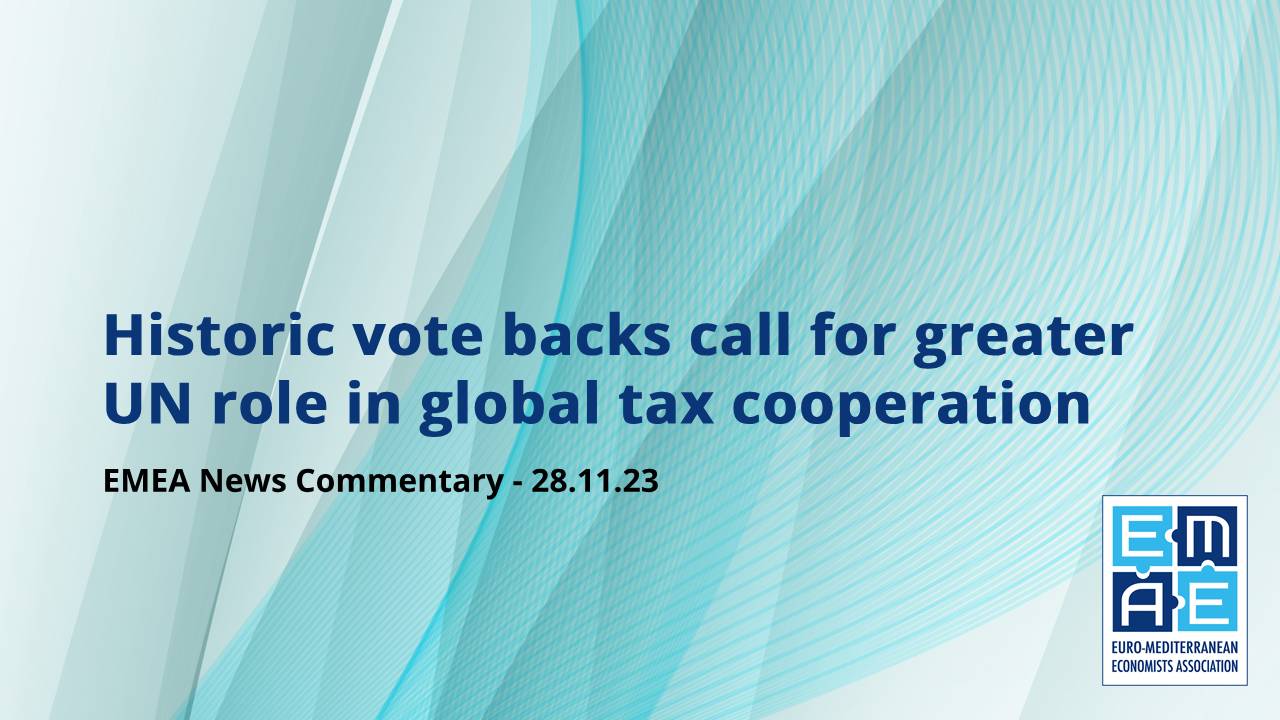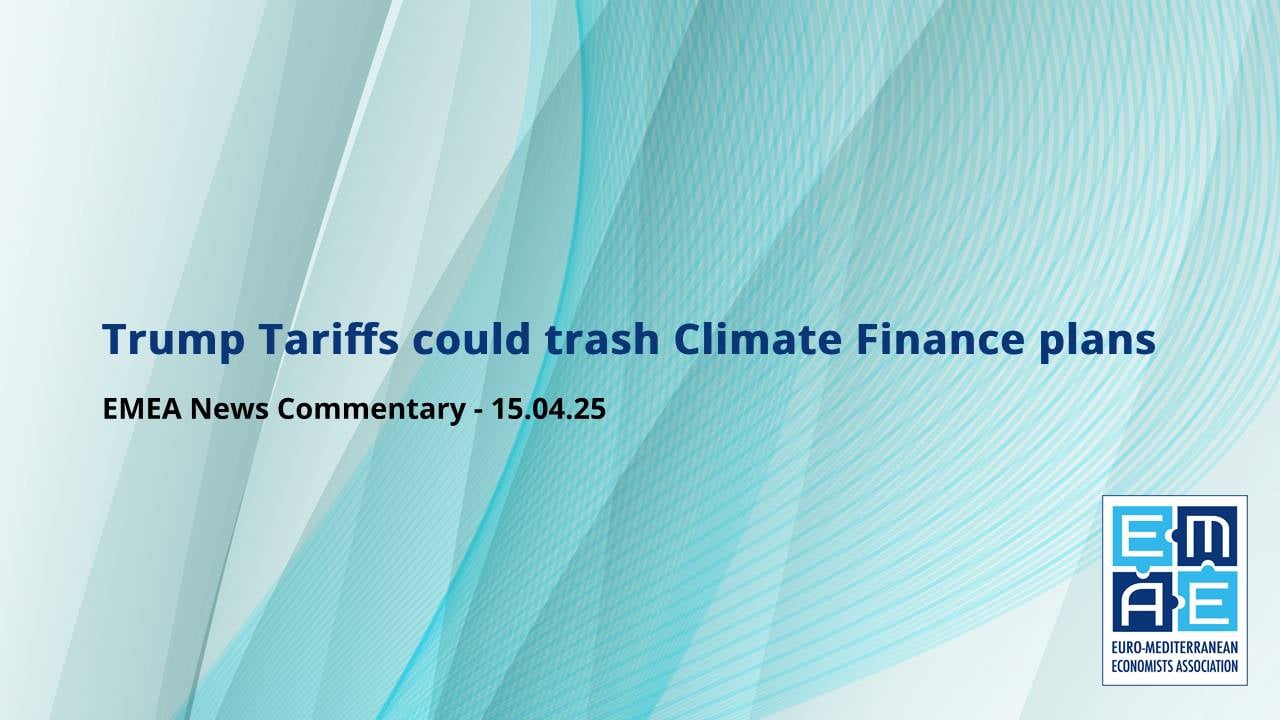The United Nations (UN) General Assembly has voted overwhelmingly in favour of developing a global tax framework – in a move that looks likely to blunt decades of influence that the Organisation for Economic Cooperation and Development (OECD) has held over universal tax policy.
The momentous resolution, which could see a big shake-up in how global tax rules are set, was spearheaded by an African-led initiative to bring international tax cooperation under UN control.
Despite opposition from the entire European bloc, together with the US and UK, there was widespread support.
Reuters reported that 125 mostly developing countries backed the draft resolution – proposed by Nigeria – to establish a “framework convention on international tax cooperation.” A grouping of 48 mainly developed countries voted against the plans and a further nine abstained, including a number of OECD members.
Whilst those advocating change have warned wealthy nations against further attempts to stall reform to the existing system, all UN member states will now be invited to join the intergovernmental negotiation process – regardless of how they voted.
The decades-long back story here has been the repeated demands by low-and-middle-income nations for a greater say in international tax matters – and certainly much more so than has previously been the case with the OECD at the helm.
According to Reuters, developing countries “have lamented for years that they are unable to influence discussions on global tax cooperation at the OECD, where the rules for cross-border taxation are generally thrashed out.”
This latest UN resolution centred on whether the United Nations will be able to deliver more equitable representation for developing countries.
Attempts to thwart the vote
Prior to the vote, the Financial Times reported that EU and UK diplomats had been accused of trying to “kill” the proposals.
According to the International Consortium of Investigative Journalists (ICIJ), “in recent years criticism over the outsized power wielded by wealthy countries in its closed-door decision-making has grown, including at the top levels of the U.N.”
The landmark decision has been welcomed by the African Union (AU) as a “beacon of hope” in signalling an important step forward towards better representation on tax discussions.
In a statement, the AU said the vote would “facilitate the access of much needed financial resources. The decades’ long fight of Global South countries to establish a fully inclusive process at the United Nations, to participate in agenda setting and norm setting on international tax, is now a reality.
“We now look forward to building on this spirit of cooperation and agreeing on an effective UN Framework Convention in International Tax Cooperation, to urgently mobilise resources for our development,” the AU added.
Taking into account developing needs, priorities and capacities
The new resolution called for the creation of an ad hoc inter-governmental committee, open to all UN member states, with a bureau of no more than 20 members, that would reflect gender and regional balance.
According to the resolution, their work must take into account “the needs, priorities and capacities of all countries, in particular developing countries.”
The resolution also urged the committee to take an “holistic” approach to setting the terms of reference, considering “interactions with other important economic, social and environmental policy areas,” whilst also focussing on specific priorities “such as measures against tax-related illicit financial flows.”
The committee’s aim will be to establish – by August 2024 – the terms of reference for a United Nations framework convention on international tax cooperation.
With Nigeria being instrumental in getting the new resolution across the line, the country’s permanent representative to the UN, Tijjani Muhammad-Bande said: “As we navigate through a world marked by unprecedented challenges, economic uncertainties, [the end] of the COVID-19 pandemic and the present climate crisis … the role of effective, inclusive international cooperation becomes more crucial than ever.
“This resolution is not just a policy document, it is a testament to our collective resolve for a fairer, more resilient, global economy,” Muhammad-Bande said.
OECD “proud of its record”
Defending the OECD position on international tax cooperation, the organisation’s Secretary-General, Mathias Cormann, said he was “proud of its record of achieving consensus-based solutions.”
For decades, the 38 members of the OECD have set the agenda on international tax issues, ranging from guidelines for intra-group transfer pricing, to how tax authorities share bank account information.
In 2021, it steered a deal involving 140 countries that re-wrote the rules on cross border taxation for the first time in a generation, making them more aligned with the age of digital commerce, enabling big multinationals to register profits in low-tax countries.
The two-track was meant to create a 15% global minimum corporate tax rate, calling for a new treaty that would transfer a certain amount of multinationals’ tax obligations to the countries where their companies’ clients were located.
Although, at the time, it was hailed as a landmark step towards curbing corporate tax avoidance, its implementation has been plagued by delays.
KPMG global tax policy leader, Grant Wardell-Johnson, said that though the two-track OECD overhaul had been backed by the G20 group of economies with the aim of creating a global tax consensus, in light of the latest UN vote, there was likely to be increased cooperation between it and the OECD in the future.
“It is hoped that the UN will focus on areas where there are current needs for low-income economies. This includes illicit financial flows and bringing the formal economy into the formal economy,” Wardell-Johnson told Reuters.
Taking backing power over global tax rules
Meanwhile, Alex Cobham, the Chief Executive of the Tax Justice Network (TJN), said it has been an historic victory delivered by countries of the Global South, that would be beneficial to people across the world. “Tax havens and corporate lobbyists have had too much influence on global tax policy at the OECD for too long,” he commented. “Today, we start to take back power over global tax rules that affect all of us.”
TJN pointed out that the new UN vote had been half a century in the making and had even been considered an impossibility. The previous attempt to bring tax rule decision-making to the UN was in the 1970s. “The failure of the attempt dissuaded any similar attempts for nearly 50 years,” noted Cobham.
He said that during the past year – and especially leading up to the UN vote – there had been strong opposition to the resolution from the OECD and certain members. The UK and EU had come in for particular criticism in recent weeks from UN negotiators for trying to “kill” the UN process and for negotiating in “bad faith.”
Potential $5 trillion loss in tax revenues
In its 2023 State of Tax Justice report, the TJN warned that countries could lose nearly $5 trillion in tax revenue over the next decades, with multi-nationals and wealthy individuals continuing to use tax havens to whittle down their tax bills. The report highlighted four countries, amongst other jurisdictions, which had enabled the loss of public money: the UK, the Netherlands, Luxembourg and Switzerland – each of these being OECD members.
After the UN vote, the TJN further commented: “The success of the resolution, despite the resistance from the world’s strongest economies is a rare feat and demonstrates the overwhelming demand from countries outside the OECD for the meaningful voice on global rax rules which they have been historically denied.”
Tove Maria Ryding, tax coordinator at the European Network on Debt and Development, said adopting the new UN tax resolution marked “a truly historic shift”, criticising the “minority group of mainly OECD countries” that had voted against it.
“This includes the EU countries, which claim to be committed to international tax cooperation but proved the exact opposite today by voting against the Africa Group’s resolution,” Ryding said. “By doing that, they are not only undermining a fair and effective global tax system, but also acting against the interests of their own citizens, who pay a high price when wealthy individuals and big corporations use international loopholes to dodge taxes.”
But Ryding cautioned that negotiations on the tax convention could only begin once the terms of reference were agreed upon – and that could take up to a year.
“[If] OECD countries show the same attitude as they did today, it’s going to take forever to get a truly global agreement, which is why we really want to stress the importance of having all those countries show a true spirit of not just cooperation, but also urgency,” Ryding said.
“All countries are losing large sums of money because of international tax dodging, so we really have no time to waste.”
UN vote challenges OECD global tax leadership | Reuters
UN votes to create ‘historic’ global tax convention despite EU, UK moves to ‘kill’ proposal – ICIJ
UN adopts plans for historic tax reform – Tax Justice Network
UN vote challenges OECD global tax leadership | Reuters
Developing countries and Europe in dispute over global tax role for UN (ft.com)
Eurodad reaction to reports that the EU and UK are obstructing UN tax negotiations – Eurodad





